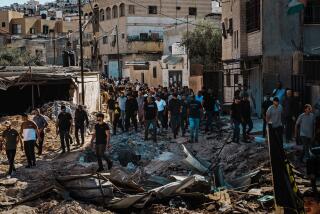Looters Descend on Iraqi Camp After British Soldiers Pull Out
- Share via
BAGHDAD — Looters ravaged a former British base near the southern Iraqi city of Amarah on Friday, a day after the remaining troops abruptly pulled out in what followers of radical Shiite cleric Muqtada Sadr hailed a victory over the “occupiers.”
The scene at Camp Abu Naji was one of devastation, witnesses said, as the pillagers, some hoisting photos of Sadr, roamed the base that once hosted the Royal Scots Dragoon Guards, and, more recently, the Queen’s Royal Hussars. The base had been home to about 1,200 British troops who patrolled southeastern Iraq.
“Everything that could be carried was taken,” said an Iraqi army major in Amarah, who asked not to be named because of the security situation in the city of 300,000 nearly 200 miles southeast of Baghdad.
Items taken included furniture, generators, wooden doors, corrugated metal roofs and just about anything else that could be resold, the major said.
The British plan had been to turn the camp over to Iraqi authorities, but several Iraqi officials told reporters that the sudden withdrawal Thursday took them by surprise. Iraqi forces didn’t have enough time to secure the facility before the looters swooped in, Iraqi officials said.
Confronted by Iraqi troops, the Iraqi major said, some looters continued to ransack the base, taunting the security men by saying, “Shoot me!” They then burned what remained of the facility, which had been an Iraqi army camp before the British moved in after the fall of Saddam Hussein in April 2003.
There was no immediate word on casualties.
Cmdr. Jane Allen, a British military spokeswoman in Baghdad, attributed the pillaging to poor residents seeking items for resale, and not to political motivations.
“The prospect of gaining access to equipment ... is likely to have been too much to resist,” Allen’s statement said.
In a statement this month, the camp commander, Lt. Col. David Labouchere, said the move would be completed “by mid-September.”
It was unclear Friday why the British apparently had advanced their departure date, but supporters of Sadr, whose militia forces have frequently clashed with the British, said the troops had been chased out.
The camp had suffered numerous mortar strikes in recent days, attacks widely believed linked to Sadr’s Al Mahdi militia. His allies are a powerful political force in Amarah, long a strategic gateway to neighboring Iran, and other parts of southern Iraq, where most residents are Shiites.
Wild celebrations broke out among Sadr supporters as word of the British pullout spread.
“The Sadr movement rejects the occupation and its presence,” said Sheik Aba Dar, a Sadr advocate in Amarah.
British authorities have described the pullout as having two aims: turning over regional security to British-trained Iraqi forces and repositioning troops to counter the weapons-smuggling threat from Iran. British border patrols once based at the camp will spread out to the deserts and marshes of Maysan province, of which Amarah is the capital, authorities said.
“I have been asked to assist ... in clamping down on smugglers,” Labouchere said in the statement announcing the camp shutdown. “The very best way I can help is to concentrate my efforts on the border.”
U.S. officials have expressed increasing concern that anti-U.S. Shiite militias have been receiving arms and bomb-making material from Iran, a Shiite-dominated nation that has close links to the major Shiite political parties holding political power in Iraq. Shiite militias are prime suspects in the epidemic of death-squad killings that have ravaged Iraq.
For a short period after the British forces arrived, southern Iraq was considered a haven, even as the Sunni Arab-led insurgency raged in the central, western and northern stretches of the county. In the south, British troops patrolled in shorts, set aside their flak jackets and sipped tea with the residents.
But the sense of stability soon crumbled as British forces ran into increasing resentment from Shiite tribes, militias and assorted other power brokers. In one of the most stunning incidents, six British soldiers were killed during an attack in June 2003 in the town of Majar Kabir, near Amarah.
Today, the once-calm southern port of Basra, Iraq’s second most populous city, has become a hot bed of violence and intrigue featuring rival political factions, oil-smuggling gangs and religious militias. British forces have struggled to help restore order in Basra and elsewhere in the south.
Raheem Salman of The Times’ Baghdad Bureau and a special correspondent in Basra contributed to this report.
More to Read
Sign up for Essential California
The most important California stories and recommendations in your inbox every morning.
You may occasionally receive promotional content from the Los Angeles Times.










